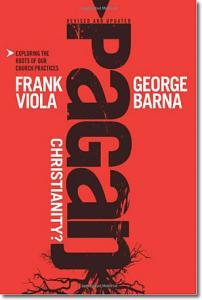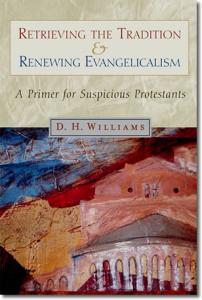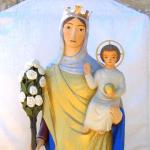
Pagan Christianity grabbed the attention of many Christians seeking to “deconstruct” their faith since it’s publication in 2012. Let me say up front – there are several points made Viola-Barna that I agree with, BUT this book seems to base many of it’s ideas on historical blunders and misrepresentations.
I am going to offer several articles showing clear examples of how Viola-Barna have misrepresented the history of early Christianity:
OUTLINE OF THIS SERIES:
- The use of “scholarly footnotes.” I will give very clear examples of serious flaws in Viola’s footnotes. He has either purposely misled his readers OR he hung himself (like Haman) on his own scaffolding. [I know…footnotes are boring. But Viola’s use of footnotes is an important part of his ruse…it is a failed rhetorical device.]
- Viola claims that Christians only met in private houses and did not meet in (or build) church buildings until the fourth century. There are several historical data points and archeological facts that show this to be a ridiculous claim.
- Viola makes the case that early Christian pastors did NOT preach structured sermons, nor use rhetoric like the pagan Greek philosophers. I will give clear examples of how this is simple ignorance of early Christian writings AND reveals a serious lack of New Testament scholarship that hundreds of footnotes cannot overcome.
- Viola claims that primitive Christianity did not have hierarchy.
I will use two excellent scholars and simply cite from the New Testament to illustrate the ridiculous nature of this claim.
- Finally, Viola has a strong dislike of philosophy and states that Christian seminaries are “built on the Platonic idea that knowledge is the equivalent of moral character.” Again, I will use early Christian history coupled with excellent scholars to show why Viola is wrong-headed in this attack.
What Difference does it Make?
I grew up in a mainline denominational “high” church environment, but did not become a Christian until I was 17 yrs old in 1976. After my conversion I aligned myself with conservative, mostly charismatic-oriented Christians. Many of these Christians were fundamentalists. I knew NOTHING about the faith, so I learned the lingo, accepted the dogma and ran the race with great zeal. Until around 1985 I embraced the underlying assumptions made by Viola-Barna without question.
In the late 80’s my own knowledge base of the biblical text led me to question [deconstruct] many of the things Viola-Barna are claiming to be true. Almost all of the highlights in my spiritual life happened outside the formal “church” environment. To use Viola’s jargon, my church preference to this day is “organic.” Small groups, house gatherings and parachurch meetings have been the environment for most of the serious spiritual input in my life.
I agree with many of the concepts Viola-Barna present…HOWEVER…
In this series of articles I will focus attention on the numerous historical misrepresentations Viola makes in his book. His pseudo-academic presentation takes advantage of Christians looking for answers and gives them half-baked bread. Our shared Christian history is very important. Believe what you want, but please do not misrepresent history to support your beliefs.
In my opinion, Viola-Barna would have done far better to simply offer their ideas and observations/opinions without attempting to cloak their presentation as “scholarship.” Several observations on the condition of the contemporary church have validity, but Viola has developed a predicate argument, a critique of early Christianity, and then feels the need to “prove” the predicate. The result is that Viola makes accusations and definitive statements from a flawed historical/biblical context using hundreds of footnotes that cannot be trusted. He uses his “research” as a hammer…and he is looking for nails.
“The way of fools seems right to them, but the wise listen to advice.”
Proverbs 12:15
After writing the bulk of my critique, I stumbled onto a four-part review of Pagan Christianity written by Ben Witherington, Professor of New Testament at Asbury Seminary. Witherington is an immanent scholar. His work is excellent and I have used him as a resource in several of my research projects. Witherington offers some of the same criticisms of Viola that I make, but one comment speaks volumes:
Viola had the attention of a world-class scholar who was trying to “help” him understand primitive Christianity…and he ignored the scholar!
Notice Witherington’s final comment above, “It’s a pity.” When I read Witherington’s comments I was saddened to realize that Viola made a choice: he turned his back on solid scholarship so he could throw bombs…and make some coin selling books.
 For those who have trusted Viola-Barna in their critique of the contemporary church, please know that they are using an old Protestant “Free Church” argument based on the premise:
For those who have trusted Viola-Barna in their critique of the contemporary church, please know that they are using an old Protestant “Free Church” argument based on the premise:
Christianity became distorted very soon after the time of the apostles. Some will admit value to the second century church, but with Constantine the gospel was so corrupted that only a remnant survived until the Reformation. [this comes from my book review of an excellent work by D.H. Williams, Retrieving the Tradition and Renewing Evangelicalism.]
Williams lays out the case for how this old Free church model of early Christianity is itself distorted, much of it fueled by the eighth century forgery, the Donation of Constantine.
My review of the Williams book will give you the main points, but I recommend this book for any serious Christian desiring to understand the early non-Protestant Christian faith.
Back to Viola and Pagan Christianity
Ultimately I think this flawed “Free Church” model is (at least in part) what fuels Viola’s understanding of Christianity. He repeats some of the flawed historical claims many Protestants have accepted for centuries. The only difference is that Viola had a rare opportunity to correct some of his misconceptions when he had the personal attention of Ben Witherington…and it is a pity that he did not welcome that moment.
THUS…I offer my criticisms of Pagan Christianity….because,
Early Christian History Matters.
See Part 2: Christian Church Buildings Prior To Constantine












